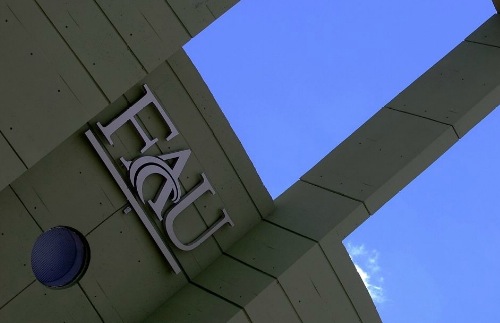
Over the next few days, a small student group will stage a series of events on FAU’s Free Speech Lawn. The student group intends to raise political awareness of certain policies of the State of Israel with which they disagree. The group is a registered student organization at FAU and has complied with the University’s policies in reserving space on the Lawn for their events.
This student group’s activities are not unique to our institution. For decades, students at universities across the United States have demonstrated, protested, and otherwise expressed their divergent points of view on an endless array of topics – including, of course, the long-standing conflict in the Middle East. This reflects a fundamental tenet of public higher education in our country, which is that students are free to lawfully question, challenge, and engage one another on even the most difficult and sensitive topics. Indeed, it is the unique mission of public higher education to provide a peaceful and lawful sanctuary for society’s most challenging debates.
This student group has previously held similar events at FAU. Despite the group’s small size (its membership constitutes approximately one-tenth of one percent of the FAU student body), some of those events garnered media coverage and generated a degree of controversy. Part of that controversy arose from reckless and unfounded allegations that FAU endorsed the student group’s message. Those allegations are absolutely false.
While FAU allows students to lawfully express their opinions and beliefs, that does not mean that FAU agrees with those opinions or beliefs. Our students and their organizations speak for themselves -- they do not speak for, or on behalf of, the University. I want to emphasize that the views expressed by this particular student group, or by any other student group, or even by the student body at large, do not necessarily represent the views of FAU or its administration.
Let there be no mistake about it: FAU deeply values its relationships with the State of Israel and with our many Jewish students, faculty, staff, neighbors, and friends around the world. Our Hillel Center and Chabad Student Center are large and thriving. We have student exchange programs with universities in Israel, and FAU students, scholars, and officials regularly travel to Israel for academic or other purposes. We have proudly hosted many Israeli officials and visitors on our campuses over the years. Our Center for Holocaust and Human Rights Education trains educators from around Florida to teach Holocaust and genocide studies, and our library houses three major resources dedicated to the study of Jewish culture and history: (i) the Judaica Sound Archives, a center that collects, preserves, and digitizes Judaica audio recordings and musical scores dating back centuries; (ii) a Yiskor Memorial Books special collection of books written by Holocaust survivors that document the shtetls destroyed by the Nazis; and (iii) a Visual History Archive, which offers online access to more than 1,000 English-language testimony videos by Holocaust survivors and witnesses, and cataloguing and indexing data of nearly 52,000 videotaped interviews conducted with survivors and witnesses in 56 countries and 32 languages.
Despite FAU’s deeply rooted attachments to Israel and our neighboring Jewish community, prior demonstrations by this student group prompted some irresponsible agitators to accuse FAU of tolerating anti-Semitism. These accusations are baseless, ignorant, outrageous, and offensive. Allowing students to lawfully engage in political discourse over policies of the State of Israel is not anti-Semitic. FAU unequivocally condemns anti-Semitism. By policy and practice, FAU condemns, prohibits, and vigorously punishes ANY form of unlawful discrimination or harassment that is based on race, color, religion, age, disability, sex, national origin, marital status, veteran status, or sexual orientation.
There is a sad irony embedded in the controversy surrounding this student group’s activities at FAU: both the student group and some of the critics of FAU appear to misapprehend the critical importance of free expression. The group’s criticisms of Israel often fail to appreciate that Israel is a robust democracy – unique in its part of the world – that nourishes an astonishingly broad array of public opinion and expression, even to the extent that this group’s own protest activities would be permitted to take place in Israel. Yet some of the critics of FAU appear to call for the denial of the group’s right to protest, in striking conflict with that principle of open debate that both Israel and the United States proudly cherish.
One of FAU’s core values is respect for the right of all members of our community to lawfully express their opinions and beliefs. I encourage everyone, both within and outside FAU, to understand and embrace this value. At FAU, we are doing our best to promote the vigorous exchange of ideas within an environment of tolerance, civility and respect, and to encourage our students and community members to adopt those principles and apply them in their dealings with one another.